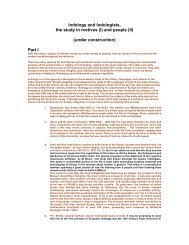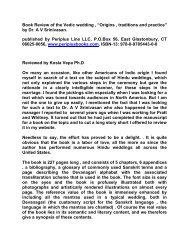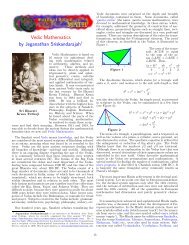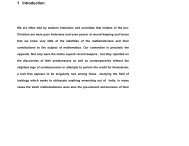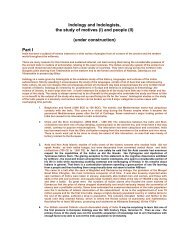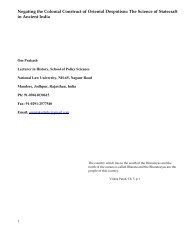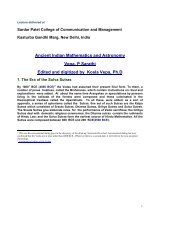The Dhaarmik Traditions - Indic Studies Foundation
The Dhaarmik Traditions - Indic Studies Foundation
The Dhaarmik Traditions - Indic Studies Foundation
You also want an ePaper? Increase the reach of your titles
YUMPU automatically turns print PDFs into web optimized ePapers that Google loves.
ased on aptitudes. In short, the system was a synonym for a meritocracy 4 . That the<br />
system was eminently successful in its own way , I have no doubt because the<br />
resulting civilization flourished for well over 5 millennia, until its very foundations<br />
were attacked by barbarians from both within and without ,barbarians, whose notion of<br />
entertainment was to build a pyramid of skulls, in order to terrorize the local<br />
population to capitulate. <strong>The</strong> current system in place after the colonial power was done<br />
reinventing and reshaping it to its own specifications, and which goes by the name<br />
Caste, is so utterly different in all significant ways, that we can safely say it has little to<br />
do with the Hindu faith or Hindu traditions such as the Guna Varna Vyavastha. <strong>The</strong><br />
Vedic division of people into 4 Varnas (Brahmana, Rajanya, Vaisya and Shudra) is by<br />
Guna and Guna only and is known as the Guna Varna Vyavastha. <strong>The</strong> Asrama system<br />
refers to the four stages of one's life, namely Brahmacharya (life of an unmarried<br />
student), Grihasthya (life of a householder), Vanaprasthaya (life of a retired<br />
householder), sannyasa (life of a monk) is based in the physical, mental and emotional<br />
changes that take place in a person as he/she ages and matures.<br />
What are the GuNAs<br />
<strong>The</strong>re are 3 GuNAs as we have explained elsewhere (see Glossary), Sattva, Rajas<br />
and Tamas and these three GuNAs occur in each and every individual in varying<br />
degrees. <strong>The</strong> relative proportion of each in the total determines the essential nature<br />
of the individual. It follows that at any given time an individual, may exhibit different<br />
modes of behavior as his personality matures and develops. <strong>The</strong> son of a Brahmana<br />
may choose not to follow the priestly vocation and may elect to go into law. As a<br />
4 See Wiki, http://en.wikipedia.org/wiki/Meritocracy<br />
165



